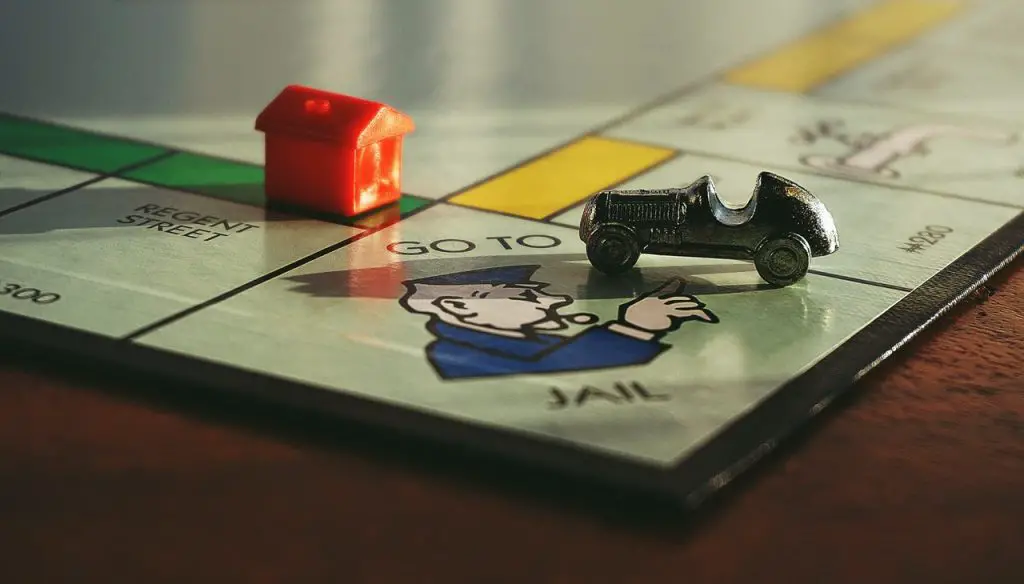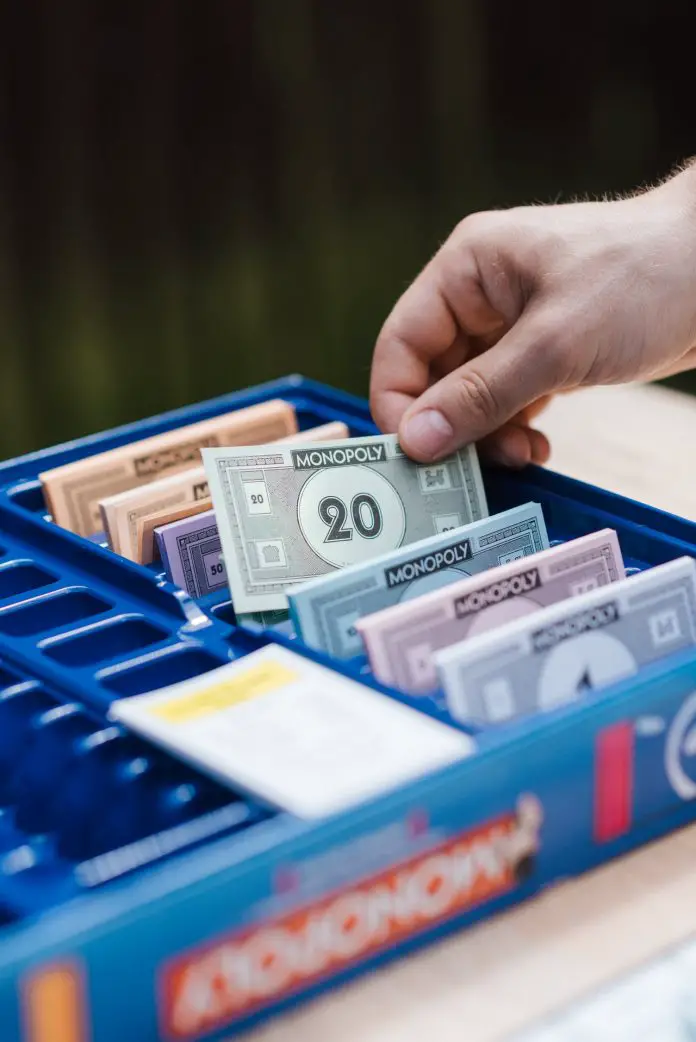Monopoly is one of the greatest property games there is. If you have a planned strategy, your chances of winning are big – unless someone else hoards blocks of your desired property sets and refuses to trade.
To win, you need to develop a working monopoly trading strategy. One of the critical skills for this is knowing how to prepare an offer and negotiate the deal.
If you struggle to pull property sets together, then this is a must-read. I share what you should pay attention to before making an offer, which offers are most convincing to players who refuse to budge, and how to conclude the deal. If you follow these monopoly trading strategy tips, your game will flow with ease.
Developing the Perfect Monopoly Trading Strategy
Monopoly is an all-time family game-night favorite! Growing up, I always thought being the Bank meant that I could control the game. I could play it for hours and not care about purchasing a single piece of property. I remember one time when I was nine, my family let me play as the Bank to earn wages and pay for a spot back in the game after I bankrupted. They let me get away with many things.
As I entered my teens, I started understanding the board, and when I finally did, no one could stop me from winning. To this day, we love the game of monopoly in our home, and when we take it out, we know hours of laughing, arguing, and having fun are ahead.
While playing, I’ve paid close attention to how monopoly works. Specific strategies increase your chances of winning. Although most of your luck is still in the dice roll, if you play the game strategically, you’ll dominate the board!
It’s true, winning is never guaranteed, but when you concoct a tempting offer and mix in excellent negotiation skills, your chances of landing deals that will advance you in the game are certain.
Related: The Complete Clue Strategy Guide
Table of Contents
What Makes Trading Difficult? And How Can You Make it Easier?
Trading in the game of monopoly is pretty straightforward. One player simply exchanges property they own with another. The burning question, however, is what happens if no one wants to trade?
There are many reasons why another player won’t consider a trade with you. These reasons could be:
- They’re holding on to a property block in the hopes of developing it themselves.
- They’re planning to trade it with another player who has blocks of the property they want.
- They don’t see how the trade would benefit them.
- They see you as a threat and don’t want to do something that would help you.
If a player refuses to trade with you, there are a few things you can do:
- Make a better offer – railroads, utilities, cash, and even mortgaged property are all fair game in a trade
- Pull another player into the deal – If you’re trying to get a monopoly on a set of properties, your opponents are going to be incredibly difficult to persuade (unless you are also giving them a monopoly on a different set of properties). Sometimes you can increase the overall benefit of a trade by bringing in a third or even fourth player.
- You can hold on to the property you want to trade until a later stage when you’re able to make the trade seem more promising.
- If you purchased a stray property block with the plan to trade, but no one wants to bite, you can consider buying or bartering for the other blocks in the set yourself. Never be afraid to change your approach. If you were dead set on getting the orange set, but you seem to have a shot at the red set, change your plan and go for the red.
The secret to trading, however, starts long before you attempt a trade. If you want to dominate the trading game, you need to focus on this from the start.
The Pillars of a Great Monopoly Trading Strategy
Long before you make your first trade, you can set some things in place that will lay a good foundation for success. A good monopoly trading strategy has three things in place: a middle-man, leverage, and excellent negotiation skills.

1. Buy up everything early on
You may be tempted to forgo purchasing property early in the game if you have a specific game plan. This is a bad idea.
Early in the game, you have no idea which properties you will have the opportunity to buy. You may be very interested in getting a monopoly on the orange set (since they are statistically the most landed on properties). But what if you never get the opportunity to buy any of the orange properties?
In order to trade later in the game, you need to get as much trading ammunition as you can early in the game. And that means buying basically every un-owned property you land on.
2. Build up leverage for your perfect property
If you want to make irresistible offers, you need to build up a leverage stash. As the game begins, focus on saving money, keeping all get out of jail free cards, and purchasing as many utilities and railroads as possible.
Use your leverage stash to sweeten up offers. If someone is hesitant to trade with you, add any of the above to make the deal seem more valuable and fair.
Let’s say you need the last block in a more valuable property set (for example, Orange, Red, or Green), and you only have a less valuable block to trade (for example, Pink). If Player X has one of the blocks you need, you can add anything extra you have to make the trade seem fairer.
You can trade properties among each other and manipulate the game until you advance to the final two, whereafter you can play it out for the top spot.
3. Negotiate the right way
The last, however, the main thing you need to make your monopoly trading strategy work is excellent negotiation and convincing skills. The key to a great negotiation in Monopoly is to give your opponent something they want.
Unless you’re planning on negotiating with your 6-year-old daughter, you have to present a reasonable offer in order to close the deal. So forget about sweet talking and playing mind games, just be logical.
If you’re asking someone to give you a property that completes your set and allows you to start building houses, you better be prepared to offer them a pretty sweet deal.
Example: They already have a monopoly, but are low on cash
Say you need one more red property to complete your set and the opponent with that property already has a monopoly on the pink set. If they haven’t managed to build any houses yet because they are low on cash, then you may be able to pry that red property from them by giving them the money they need to build those first several houses.
Example: The Middle Man
Let’s imagine a scenario where you need a player to give you a red property so you can complete the set and begin building on them.
The problem is, you just don’t have the resources to make an offer attractive enough to pry that last red property from your opponent.
You: One Pink, one blue, and two Red properties
Player X: One Red and one Pink property
Player Y: Two blue properties and one pink property
If you’re trying to trade your Pink block for the remaining Red one you need, and Player X refuses to trade, you can recruit a middle man to join in the trade.
You need Player X to give you that red property, but your one pink property isn’t enough to sway her. However, if you could get two pink properties to Player X, then they would be willing to part with the red property.
You then offer Player Y, the middle man, your blue property in exchange for their pink one.
Player Y is happy to accept because they’re completing a set. You are then able to trade two pink properties to Player X in exchange for their red property.
In the end you gave up One pink and one blue to complete your red set. Not a bad trade for you and it worked out for the other players as well!
4. Timing matters
Sometimes an offer that was rejected the first time will be accepted when the circumstances are better.
For example, perhaps you can sweeten your offer with a get out of jail free card when your trade partner gets stuck in jail. Or maybe you can make a successful cash offer on a property when a player lands on a particularly expensive space. Perhaps a player has just managed to complete a set when no one else has been able to, and everyone needs to make some bold moves before that player runs away with the game.
Circumstances change in Monopoly, so pay attention and don’t be afraid to make the same offer at a later point in the game.
5. Create a sense of urgency
Players can often fall into the trap of wanting to wait and see what happens before they engage in a trade. Maybe they have two green properties and the third green property is currently un-owned. They may be waiting to see if they can land on that space before they consider trading with anyone.
If you have a reasonable trade proposal, you may need to convince them that they can’t afford to wait. How?
Well it’s easy if one player is clearly ahead. If you’re not the player who is ahead and they aren’t the player who is ahead, then you can always create urgency by pointing out how you are both falling behind and need to act fast in order to avoid falling behind.
If no player is clearly winning, then it can be harder. You may also have a hard time negotiating if you are clearly leading, because no one wants to assist you in any way.
You won’t always be able to convince your opponents to act now. But I’ve had the most success by pointing out the benefits of a trade, then explaining how they will gain an advantage.
Something like this: “Yes, if you trade me that property I’ll be able to start putting buildings there, but you’ll be able to start building as well. We’ll both gain an advantage, and if we don’t do something Jess is going to run away with this game!”
Frequently Asked Questions
When can I start trading in monopoly?
Although some players have their own house rules, there is no official game limitation on when trading is allowed. The moment a property is purchased, it is eligible for trade. If you start the game playing with another player, you can quickly trade desired properties when one of you lands on it.
What type of trades are allowed?
Typically, whatever the players involved in the trade negotiations agree on, is allowed. But a few items are generally not tradable, included houses and hotels.
If you land on someone’s property and you can’t pay the rent, you can negotiate a property trade to settle your debt. If your tradable property is worth more than the rent, you can even use the other half of your property value as an advance payment for when you land there again.
Another example of an unconventional trade is when one player offers their property rent up in exchange for another property block. For example, if you want an Orange block, you can offer the rent of another property block you own as “payment” for it. You can agree that the current owner of the Orange block receives all the rent your Green property accumulates from all players during the following three completed rounds.
Can I force a trade in monopoly?
The standard version of monopoly doesn’t set out rules for a forced trade. However, other versions do.
If another player refuses to trade with you, your best bet is to keep making an offer until you make one they can’t resist. If it seems like they’re holding on to a property piece just to keep you from advancing, find other ways to force them to give it up, like bankruptcy.
Does a good monopoly trading strategy guarantee a win?
Monopoly is a game, and like all games, there’s never a guarantee. While many experts will sell the idea of always winning, the truth is that a trading strategy will only get you as far as you take it.
To get the most out of any trading strategy, you need to practice the skills you need to implement it.
Final Words
Cutting a beneficial deal with another player can significantly improve your odds of winning in Monopoly. You can trade on or between your turns. Trading can help you advance in the game, improve your cash flow, and get the property you ultimately want. It’s vital to play strategically and maximize your trade value since trading is an inevitable part of the monopoly game.
Playing monopoly strategically is fun and emotion-filled at the same time. When you’re playing with family or friends, it’s easy to implement a monopoly trading strategy and bend the house rules in your favor. With every dice roll, you won’t know what awaits you before it happens. But if you have a strategy in mind, you can swing the cards your way.
If you’re practicing for a tournament, there are a few tournament rules to keep in mind. Before planning and developing your play, you should familiarize yourself with the competition-specific rules. While many competitions follow strict monopoly rules, others have their own set of rules in place. You can still, however, implement an excellent monopoly trading strategy and beat your opponents!

Veronica is a Green Bay-based freelance writer and editor with extensive experience with board games. When not busy scribbling her thoughts, you might find her in her garden, hiking out in the woods, or exploring new food joints.
Veronica is a die-hard board game and chess hobbyist by night. She likes to try out new games and is always on the lookout to recruit new players for her game night (so beware!). When not playing board games or throwing darts, she is usually busy painting miniatures (or doing other nerdy stuff).
She is the CEO & Content Writer of Indoor Games Zone. She shares her expertise from years of playing chess, board games, and darts.

![Stiga XTR Pro Review | 1,559+ Global Ratings (In-Depth Guide) [year] Stiga XTR Pro Review](https://indoorgameszone.com/wp-content/uploads/2021/08/Stiga-XTR-Pro-Review-218x150.jpg)







